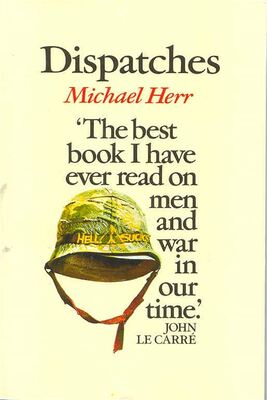
Sometimes I didn’t know if an action took a second or an hour or if I dreamed it or what. In war more than in other life you don’t really know what you’re doing most of the time, you’re just behaving, and afterwards you can make up any kind of bullshit you want to about it, say you felt good or bad, loved it or hated it, did this or that, the right thing or the wrong thing; still, what happened happened.
You know how it is, you want to look and you don’t want to look. I can remember the strange feelings I had when I was a kid looking at war photographs in Life, the ones that showed dead people or a lot of dead people lying close together in a field or a street, often touching, seeming to hold each other. Even when the picture was sharp and cleanly defined, something wasn’t clear at all, something repressed that monitored the images and withheld their essential information
In the months after I got back the hundreds of helicopters I’d flown in began to draw together until they’d formed a collective meta-chopper, and in my mind it was the sexiest thing going; saver-destroyer, provider-waster, right hand-left hand, nimble, fluent, canny and human; hot steel, grease, jungle-saturated canvas webbing, sweat cooling and warming up again, cassette rock and roll in one ear and door-gun fire in the other, fuel, heat, vitality and death, death itself, hardly an intruder. Men on the crews would say that once you’d carried a dead person he would always be there, riding with you. Like all combat people they were incredibly superstitious and invariably self-dramatic, but it was (I knew) unbearably true and close exposure to the dead sensitized you to the force of their presence and made for long reverberations; long. Some people were so delicate that one look was enough to wipe them away, but even bone-dumb grunts seemed to feel that something weird and extra was happening to them.
The Soldier’s Prayer came in two versions: Standard, printed on a plastic-coated card by the Defense Department, and Standard Revised, impossible to convey because it got translated outside of language, into chaos – screams, begging, promises, threats, sobs, repetitions of holy names until their throats were cracked and dry, until some men had bitten through their collar points and rifle straps and even their dog-tag chains.
Some people just wanted to blow it all to hell, animal vegetable and mineral. They wanted a Vietnam they could fit into their car ashtrays; the jokes went, ‘What you do is, you load all the Friendlies on to ships and take them out to the South China Sea. Then you bomb the country flat. Then you sink the ships.’ A lot of people knew that the country could never be won, only destroyed, and they locked into that with breathtaking concentration, no quarter, laying down the seeds of the disease, roundeye fever, until it reached plague proportions, taking one from every family, a family from every hamlet, a hamlet from every province, until a million had died from it and millions more were left uncentred and lost in their flight from it.
Two hundred metres away, facing the Marine trenches, there was an NVA sniper with a .50-calibre machine gun who shot at the Marines from a tiny spider hole. During the day he fired at anything that rose above the sandbags, and at night he fired at any lights he could see. You could see him clearly from the trench, and if you were looking through the scope of a Marine sniper’s rifle you could even see his face. The Marines fired on his position with mortars and recoilless rifles, and he would drop into his hole and wait. Gunships fired rockets at him, and when they were through he would come up again and fire. Finally, napalm was called in, and for ten minutes the air above the spider hole was black and orange from the strike, while the ground around it was galvanized clean of every living thing. When all of it cleared, the sniper popped up and fired off a single round, and the Marines in the trenches cheered.
We thought at first that he was dead, taken off by a booby trap on the trail, but his colour was much too awful for that. Even the dead held some horrible light that seemed to recede, vanishing through one layer of skin at a time and taking a long time to go completely, but this kid had no colour about him anywhere. It was incredible that anything so motionless and white could still be alive.
They weren’t judging me, they weren’t reproaching me, they didn’t even mind me, not in any personal way. They only hated me, hated me the way you’d hate any hopeless fool who would put himself through this thing when he had choices, any fool who had no more need of his life than to play with it in this way.
It was inevitable that once the media took the diversions seriously enough to report them, they also legitimized them. The spokesmen spoke in words that had no currency left as words, sentences with no hope of meaning in the sane world, and if much of it was sharply queried by the press, all of it got quoted. The press got all the facts (more or less), it got too many of them. But it never found a way to report meaningfully about death, which of course was really what it was all about.
Those who remember the past are condemned to repeat it too,